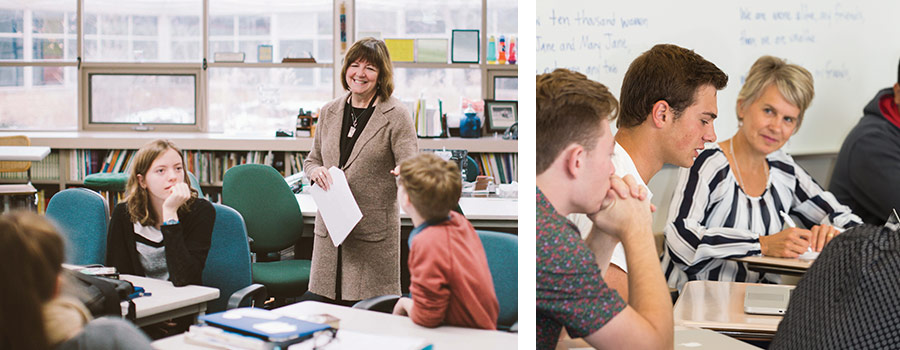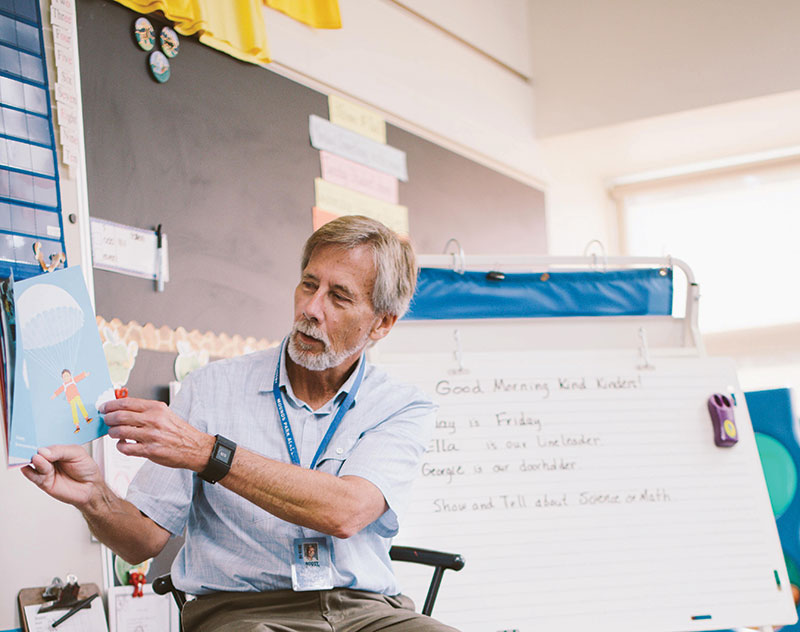Teaching Character Through Literature
A Q&A With MPA's English Teachers
When one examines the PreK-12 scope and sequence of MPA's English curriculum, a central theme that emerges is a strong belief in the ability of literature to inspire caring, inclusive, and courageous human beings. While character education is embedded in every discipline, it shines brightly in English. The themes students explore through literature build upon one another, ranging from being a good friend in PreK, to perseverance in fifth grade, to forgiveness in 12th grade.

"Teaching character through literature is ongoing, and a thread that pulls all of the divisions together," says Deedee Stacy, fourth grade teacher.
We asked our English teachers about how they approach character in their classrooms. In a variety of ways, they all share Sara Mohn, Upper School English teacher's sentiment: "It's why I teach English. We read to be better people."
WHY IS TEACHING CHARACTER THROUGH LITERATURE SO EFFECTIVE?
Katherine Myers, Upper School English teacher: Fictional characters give us a safe distance to watch the common foibles, errors, and misjudgments unfold and to celebrate the moral strongholds, the beauty of humanity, and the redirection of so many damaging decisions that can be corrected. Literature allows us to listen to another's story and observe ourselves and our hopes and our fears without going forth and making the same mistakes.
Sara Mohn, Upper School English teacher: Imaginative literature is a vehicle like no other. It allows us to empathize by climbing inside another's head.
Nancy Lage, librarian: This is the concept of windows and mirrors, where students can hear stories about characters whose lives and experiences are similar to their own and also very different. It's a safe way for children to move beyond their own environment and try to understand what it might be like for someone else. Literature helps us build cultural competency and global understanding.

Scott Wilson, first grade teacher: Children can identify with the characters and see when various character traits come into play. It is a great opportunity for the teacher to help the child identify and give a name to what they are hearing about. Then when they have the same feeling they can name it and own it.
HOW DO YOU SELECT THE LITERATURE YOU TEACH?
Anne Devout Atchison, Middle School English teacher: Honestly, it's an agonizing process. Though there are different purposes and reasons behind each piece of literature I select, here are my criteria: Good literature reveals truth in ways that non-fiction cannot; it affirms the beauty of life; it displays and honors the beauty of words; it stokes and strengthens the imagination; it provokes the status quo; it develops empathy.
Patti Meras, Middle School English teacher: The literature we read in fifth and sixth grades lays that foundation and builds upon the character pillars we teach in Middle School. I want literature to be relatable, timely, and enjoyable, but I ultimately want it to send a message of compassion and empathy for others.
For example, in "Wonder," [a children's novel by R.J. Palachio] we stop and ask ourselves, "If Auggie Pullman came to MPA, how would we welcome him and show him he belongs?" I want students to see themselves in the literature. This is deep stuff for fifth grade, but it gives kids the opportunity to jump into the character's shoes.
Literature allows us to listen to another's story and observe ourselves and our hopes and our fears without going forth and making the same mistakes.
Katherine Myers
Upper School English Teacher
HOW DO YOU SEE YOUR STUDENTS BEING POSITIVELY IMPACTED BY LITERATURE?
Yamini Kimmerle, fourth grade teacher: Reading a biography of Thurgood Marshall, and the dialogue that followed,
has led one of our students to wanting to pursue a career in social justice. Talk about music to our ears!
Anne Devout Atchison, Middle School English teacher: When following his journey to the underworld and Odysseus becomes despondent, eighth graders can empathize. This forces the question in their own lives: How can we pick ourselves up when we face the profound and painful passages of life? Together they respond, share, and imagine ways to climb out of deep pits of despair, they discover things about each other they didn't know before, and realize they don't have to climb alone. Yes, there are tears sometimes. And yes, they rejoice in each other's victories, but year after year, eighth graders come to a similar conclusion: We can and should be there for one another. Dragons can be beaten.
Shelly Steingraeber, third grade teacher: Teaching character through literature provides a concrete example for students to see, hear, experience, discuss, and connect to their own experiences. Lower School students easily relate to, connect with, and want to engage with the stories they hear. The conversations spark reflection, ideas for how to use a certain trait, and inspire the class to courageously "give it a try."